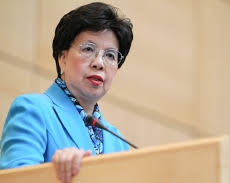After 10,000 Ebola deaths, WHO accepts failure to respond
20 Apr 2015
The World Health Organisation (WHO) plans a to set up a 1,000-strong response team to deal with future emergencies, after its weak and slow response to the Ebola crisis devastated Western Africa.
 The epidemic, the worst Ebola crisis on record, affected more than 25,000 people and killed 10,000 of them. It has been one of the most miserable failures for WHO, which could not do anything to save lives or prevent the spread of the disease.
The epidemic, the worst Ebola crisis on record, affected more than 25,000 people and killed 10,000 of them. It has been one of the most miserable failures for WHO, which could not do anything to save lives or prevent the spread of the disease.
The epidemic still seems not to have been fully contained with increasing number of cases being reported.
During the week ended 12 April 2015, a total of 37 confirmed cases of Ebola virus disease (EVD) were reported, compared with 30 the previous week. Case incidence in Guinea increased to 28, compared with 21 confirmed cases the previous week. Sierra Leone reported 9 confirmed cases, the same total as in the previous week. Liberia reported no confirmed cases.
A total of 5 Guinean prefectures reported at least one confirmed case in the week to 12 April, compared with six the previous week, a WHO report stated.
In total, 8 prefectures / districts in Guinea and Sierra Leone reported a confirmed case in the week to 12 April, compared with 10 the previous week.
This is the lowest number of districts to report a confirmed case since the end of May 2014. Of 55 districts in Guinea, Liberia, and Sierra Leone that have reported at least one confirmed case of EVD since the start of the outbreak, 39 have not reported a case for over 6 weeks, the report added.
WHO has admitted it ''simply could not cope'' with the Ebola crisis and pledged reforms to help it tackle a future outbreak.
"We have learned lessons of humility. We have seen that old diseases in new contexts consistently spring new surprises," said the statement, attributed to the WHO director-general Margaret Chan and the deputy director-general and regional directors.
"We have taken serious note of the criticisms of the organisation that, inter alia, the initial WHO response was slow and insufficient, we were not aggressive in alerting the world ... we did not work effectively in coordination with other partners, there were shortcomings in risk communications and there was confusion of roles and responsibilities...," it said.
The statement listed eight lessons learned, including areas where the WHO's response to Ebola could have been better, such as information sharing and communication.
Some critics have said that its reluctance to declare the outbreak an emergency were major factors in allowing the epidemic to spread.
In response, WHO spelled out its plans to reform so as to be better prepared for similar emergencies in future.
"We can mount a highly effective response to small and medium-sized outbreaks, but when faced with an emergency of this scale, our current systems - national and international - simply have not coped."
WHO's executive board had, in January, adopted a resolution seeking major reforms of the UN's public health agency, which include the establishment of a 1,000-strong emergency reserve force, a contingency fund and a rapid-response force, as well as a stronger command structure at the WHO and stronger international health rules to make sure every country is up to standard for disease preparedness.



















